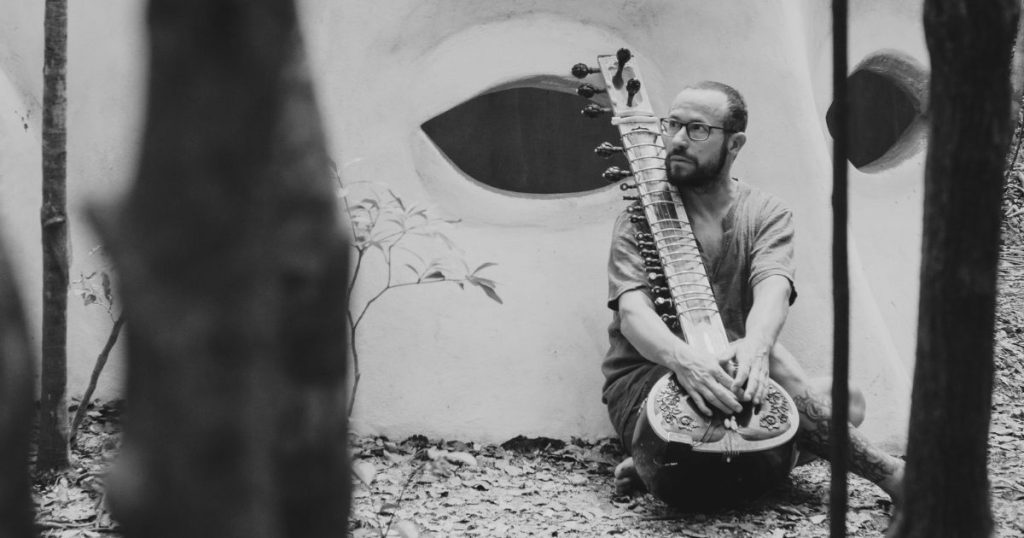

In the world of downtempo and organic house music, Barcelona-based musician and producer David Devanagari stands out as an emerging force. Blending traditional instruments like the Indian sitar and handpan with synths and organic vibes, David’s live performances are a captivating experience. His releases on respected labels like Under Your Skin Records and Cafe De Anatolia have garnered widespread acclaim. From enchanting crowds in Tulum and Ibiza to showcasing his talent at renowned venues, David Devanagari is a rising star in the genre.
#Exclusive #Interview with David Devanagari
Tell us more about yourself and your music career?
Devanagari is my lifelong project, where my experiences, emotions, and aspirations come together to be transformed into music. It gives me new experiences, sensations, and hopes while providing order and direction to my life.
The concept was born after traveling through Mexico, Central America, and exploring India, where I discovered traditions, musical legacies, and connected with emotions from all corners of the planet.
My music is a reflection of my personal journey, gathering experiences, memories, sounds, and sensations from around the world.
How would you describe your style of music?
My music is a reflection of my life experiences and goes beyond a specific style. It aims to evoke certain emotions through sounds and melodies.
The project has been active for over 10 years and has constantly evolved.
Where do you find inspiration?
Inspiration arises from landscapes, nature, food, people, and traditions of the countries I visit. The music I listen to at home is very different from the Devanagari universe. I don’t usually have direct influences from other artists in the genre; rather, inspiration comes through the path of life.
Describe how music is important to society.
Music brings people together and aids in healing. It is a universal language that transcends barriers, creates emotional connections, consoles us, and provides hope. Music is a cultural bridge that is independent of language. In summary, it is an art that unites and connects us on a profound level.
What is your best time of the day to create?
Early morning, especially before sunrise, is a magical time for creation. The stillness and renewed energy inspire fresh ideas and unhindered creativity.
Who are your musical influences?
I draw inspiration from the folk and traditional music of India, Thailand, and the sounds of Japan. I also enjoy Balkan and Klezmer music from Europe, the sounds of the North African desert, and I’m fascinated by the energy and joy of the music from Nigeria, Mali, and Senegal. Additionally, some well-known bands I can mention are Tortoise and The Cure.
What is the most difficult thing about being a musician?
As an independent artist, the most challenging part is the administrative aspect: organizing bookings, sending promos, planning tours, managing mailing lists, following up on invoices and taxes. The musical aspect of performing in shows and composing is what I enjoy 100%, and therefore, it seems incredible and wonderful to me.
What has been your biggest career highlight so far?
One of the most special moments in my career was the first collaboration with ELROW at the Bollywood party in the Space club during its final year. It was a transformative experience that made me feel part of something wonderful, transitioning from being a mere spectator to being an active part of the party and the club.
What are your latest releases?
My latest release is “Ixchel” with Cafe De Anatolia.
What is your connection with Cafe De Anatolia?
“Ixchel” is a very special release that emerged during my last visit to Mexico, where I explored the ancient Mayan lands and followed in the footsteps of the people who lived there. The more I learn about the ancient world, the more influences and energies I can capture to transform them into music. It is a true honor to have Cafe De Anatolia accompany this release, as their musical concept has always been a companion to me, and I believe my sound complements the label. It’s a beautiful symbiosis.
Are you working on something new?
Yes! I am entering a new phase starting with “Ixchel.” On July 2nd, I performed in Ibiza at the NIDO party, which served as a bridge between closing one era and starting the next. Currently, I’m completely revamping my concert, and “Ixchel” is the starting point. All the songs I’ve been playing in recent years, as well as the classics, will temporarily stop to make way for new sounds.
Where and when is your next performance?
I am finalising some dates for the end of August in Lisbon, Turkey, and possibly Croatia. Stay tuned to my social media channels for more information.
What’s the best piece of advice another musician ever gave you?
More than words, it was the kindness and trust of fellow musicians that encouraged me, even when my work was not fully developed. Knowing that people of such caliber supported me was a tremendous motivation, especially in the beginning.
What’s your process for dealing with performance anxiety?
Finding balance is key. When you live your life centered around what you’re passionate about, it brings you considerable equilibrium, even on a complex path. So simply having a joyful life centered around music, exercise, meditation, and some fasting provides you with the tools to stay away from anxiety.
How did Covid-19 change the terms of the music industry? How did it affect you?
COVID-19 was highly restrictive for the music and entertainment industry, but it strangely accommodated certain cases, leading me to believe that it was disproportionate to our sector. In my particular case, having a simple life allowed me to make drastic changes to avoid getting into debt and remain focused on music.
Do you have any advice for aspiring musicians? Do it from the heart and selflessly. The important thing is perseverance and never giving up, no matter what happens.

